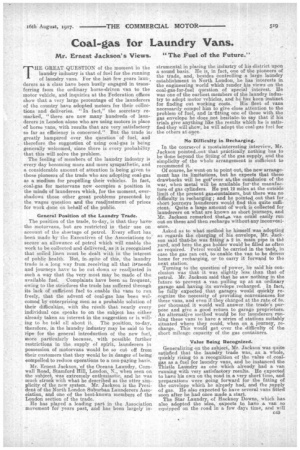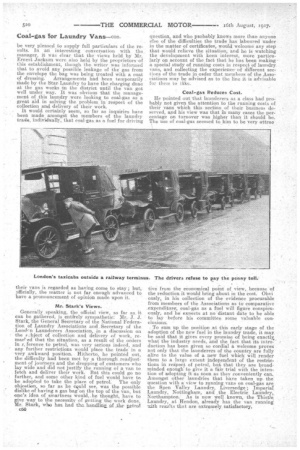Coal-gas for Laundry Vans.
Page 13

Page 14

If you've noticed an error in this article please click here to report it so we can fix it.
Mr. Ernest Jackson' s Views.
" The Fuel a the Future."
THE GREAT QUESTION of the moment in the laundry industry is that of fuel for the running of laundry vans. For the last few years launderers as a class have been busily engaged in transferring fsom the ordinary horse-driven van to the motor vehicle, and inquiries at the Federation offices show that a very large percentage of the launderers of the country have adopted motors for their collections and deliveries. "In fact," the secretary remarked, "there are now many hundreds of launderers in London alone who are using motors in place .of horse vans with results that are very satisfactory so far as efficiency is concerned." But the trade is greatly hampered oyez...the question of fuel, and therefore the suggestion of using coal-gas is being generally welcomed, since there is every probability that this will solve the problem. I The feeling of members of the laundry industry is every day becoming more and more sympathetic, and a considerable amount of attention is -being given to those pioneers of the trade who are adopting coal-gas as a medium for propelling their vehicles. In fact, coal-gas for motorvans now occupies a position in. the minds of launderers which, for the moment, overshadows those other great problems presented by the wages question and the readjustment a prices for work done on behalf of the public.
General Position of the Laundry Trade.
The position of the trade, to-day, is that they have, the motorvans, but are restricted in their use on account of the shortage of petrol. Every effort has been made by-the Executives of the Associations to secure an allowance of petrol which will enable the. work to be collected and delivered, as it is recognized that soiled linen must be dealt with in the interest of public health. But, in spite of this, the laundry trade is •a long way from receiving all that ititneeds and journeys have to be cut down or readjusted in such a way that the very most may be made of the available fuel. Complaints have been so frequent, owing to the strictures the trade has suffered through its lack of sufficient fuel to enable the vans to run freely, that the advent of coal-gas has been welcomed by enterprising men as a probable solution of their difficulties, with the result that nearly every individual one speaks to on the subject has either already taken an interest in the suggestion or is willing to be told all about it. . The position, to-day, therefore, in the laundry industry may be said to be ripe for the general introduction of the new fuel, more particularly because, with possible further restrictions in the supply of spirit, launderers in possession of motorvans would be so cut off from their customers that they would be in danger of being compelled to reduce operations to a non-paying basis.
Mr. Ernest Jackson of the Oceana Laundry, Cornwall Road, Stamford Hill, London, N., when seen on. the subject was extremely enthusiastic, and he was much strucis with what he described as the utter simplicity of the new system. Mr. Jackson is the President of the North London Suburban Launderers Association, and one of the best-known members of the London section of the trade.
He has played a leading part in the Association movement for years past, and has been largely in strumental in placing the industry of his district upon a sound basis. He is, in fact, one of the pioneers of the trade, and, besides controlling a large laundry establishment in North London, he has interests in the engineering world which render his views on the coal-gas-for-fuel question of special interest. He was one of the earliest members of the laundry industry to adopt motor vehicles, and be has keen instinct for finding out working costs. His fleet of vans necessarily compel him to give close attention to the problem of fuel, and in 'fitting one of these with the gas envelope he does not hesitate, to say that if his trials give anything like the results which he is satisfied-they will show, he will adopt the coal-gas fuel for the others at once.
No Dilliculty in Recharging.
In the coursesof a mostsinteresting interview, Mr. Jackson pointed,out that practically nothing has to be done beyond the fitting of the gas supply, and the simplicity of the whole arrangement is sufficient to recommend it.
Of course, he went on to point out, the new arrangement has its limitations, but he expects that these drawbacks will be got#over at, the conclusion of the war, when metal will be available for•the manufacture of gas cylinders. He put 12 miles at the outside limit of the present gasscontainers,.but there was no difficulty in recharging ; and he pointed out that for short journeys launderers would find this quite sufficient. Quite a lasge amount of work is collected for launderers on what are known as short journeys, and Mr. Jackson remarked thataa van could easily run out on these and then recharge without any inconvenience.
Asked as to what method he himself was adopting as regards the charging of his envelope, Mr. Jackson said that.he was fitting a 2 in. main pipe in the yard, and here the,gas holder would be filled as often as required. Petrol would be carried in the tank, in case the gas ran out, to enable the van to be driven home for recharging, or to carry it forward to the next station.
Turning to the question of power, he said his conclusion was that it was slightly less than that of petrol. Mr. Jackson said that he saw nothing in the future to prevent a van pulling up at an ordinary garage and having its envelope recharged. In fact, he fully expected that garages would quickly recognize the necessity of providing convenience& for these vans, and even if they charged at the rate of 5s. per thousand it would well answer the trade's purpose and give a good return to garage proprietors. An alternative method would be for launderers running these vans to have a series of stations suitably situated where they could, when on a journey, recharge. This would get over the •difficulty of the short mileage capacity of the gas containers.
Value Being Recognized.
Generalizing on the subject, Mr. Jackson was quite satisfied that the laundry trade was, as a, whole, quickly rising to a recognition of the value of .coalgas as a fuel for laundry vans, and he instanced the Thistle Laundry as one which already had a van running with very satisfactory results. He expected to have his own on the road in a very short time, and preparations were going forward for the fitting of the envelope which he already had, and the .supply of gas. He also expected Lo have several vans fitted soon after he had once made a start.
The Star Laundry., of Hackney Downs, which has. also adopted the idea,. expects to have a van .o equipped on the road in a few days time, and will 042
be very pleased to supply full particulars of the results. In an interesting conversation with the manager, it Was clear that the views held by Mr. Ernest Jackscrn were also held by the proprietors'of this establishment, though the writer was informed that to avoid any possible leakage of the gas from the envelope the bag was being treated with a coatof dressing.' Arrangements had been temporarily thade by the Star. Laundry to have the charging dbne at the gas works in the district until the van got well under way. It was obvious that the management of this laundry were looking to coal-gas as a great aid in solving the problem in respect of the collection and delivery of their work.
It would certainly seem, so far as inquiries have been made amongst the members of the laundry tra.51e, indiVidualls, that ceal-gas as a fuel for driving their vans is regarded as having come to stay ; but, 3fficially, the matter is not far enough advanced to have a pronouncement of opinion made upon it.
Mr. Stark's Views.
Generally speaking, the official view, so far as, it can be gathered, is entik.ely sympathetic: Mr. J. J. Stark, the General Secretary of the National Federation of Laundry Associations and Secretary of the Londe n Launderers Association, in a discussion on the e Aject of collect-ion and delivery of work, remarl ,ed that the situation, as a result of the orders in r, ference to petrol, was very serious indeed, and any further restrictions would place the trade in a very awkward position. Hitherto, he pointed out, the difficulty had been met by a thorough readjustment of journeys and the dropping of customers who lay wide and did not justify the running of a van to fetch and deliver their work. But this could go no further, and some other kind of fuel would have to be adopted to take the place of petrol. The only objeation, so far as he ekuld see, was the possible dislike of having a gas bag on the top of the van, but one's idea of smartness would. .he thought, have to give way to the necessity of getting the work done. Mr. Stark, who haa had the_ handling dile, petrol c50 question, and who psobably knows more than anyone else of the difficulties the trade has laboured 'under in the matter of certificates, would welcome any step that would relieve the situation, and he is watching the development with keen interest, more particularly on account of the fact that he has been makinga special study of running costs in respect of laundry vans, and collecting the experience of different sections ofrthe trade in opcler that members of the Associations may be advised as to the line it is advisable for them to take.
Coal-gas Reduces Cost.
He pointed out That launderers as a class had probably not given the attention to the running costs of their vans which this, section of their business deserved, and his view was that in many cases the percentage on turnover was higher than it should be. The use of coal-gas seemed to him to be very attrao tive from the economical point of view, .because of the reduction it would bring about in the cost. Obvi ously, in his collection of the evidence procurable from members of the Associations as to comparative _expen,cliture, coal-gas as a fuel will figure conspicuously, and be exnects at no distantdate to be able to lay -before his committee some valuable conclusions.
, To sum up the position at this early stage of the adoption of the new fuel in the laundry trade, it may be said that it gives every promise of -being exactly, what. the industry needs, and the fact that its 'introduction has been given so cordial a welcome proves not only that the launderers of the country are fully alive to the value, of a new fuel which will render them to a large extent independent of the restrictions in respect of petrol, but that they are broadminded enough to give it a fair trial with the intention of adopting it as soon as they conveniently can. Amongst other laundries that have taken up the question with a view to running vans on coal-gas are the Spen Valley Laundry, Liversedge.; Imperial Laundry, Nottingham, and ,the Electric Laundry,, Northampton. As is now well known,• the Thistle Laundry, at Hendon, already has the van running w.ith results that are extremely satisfactory.




















